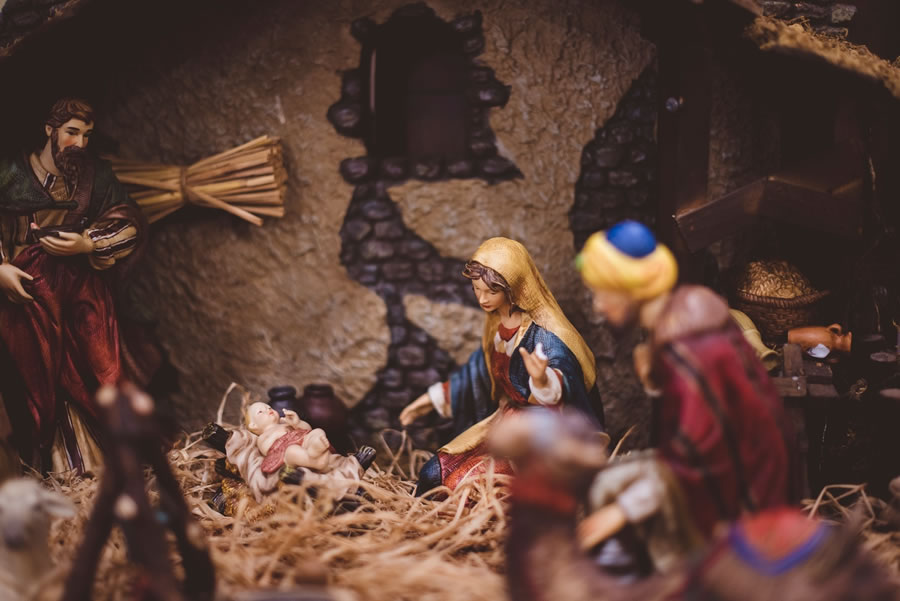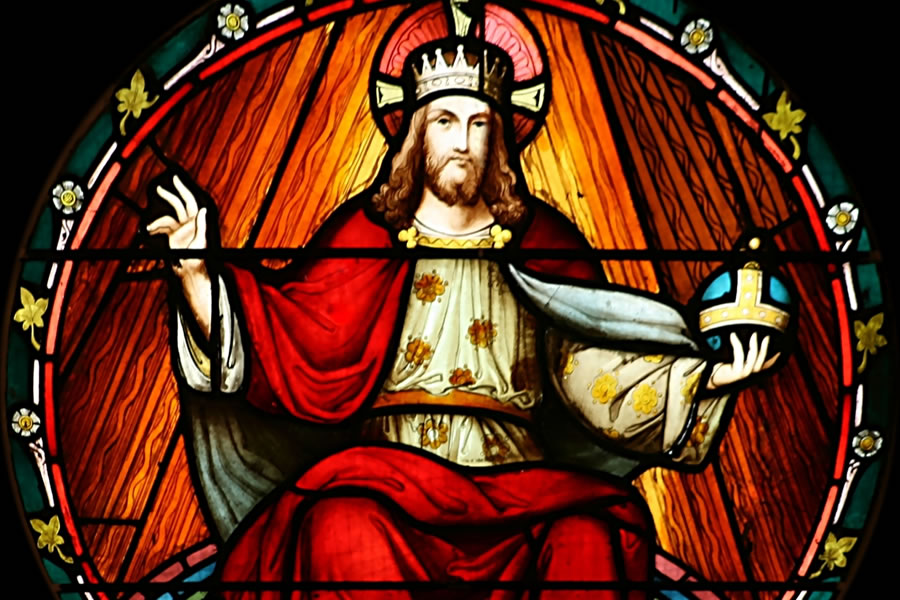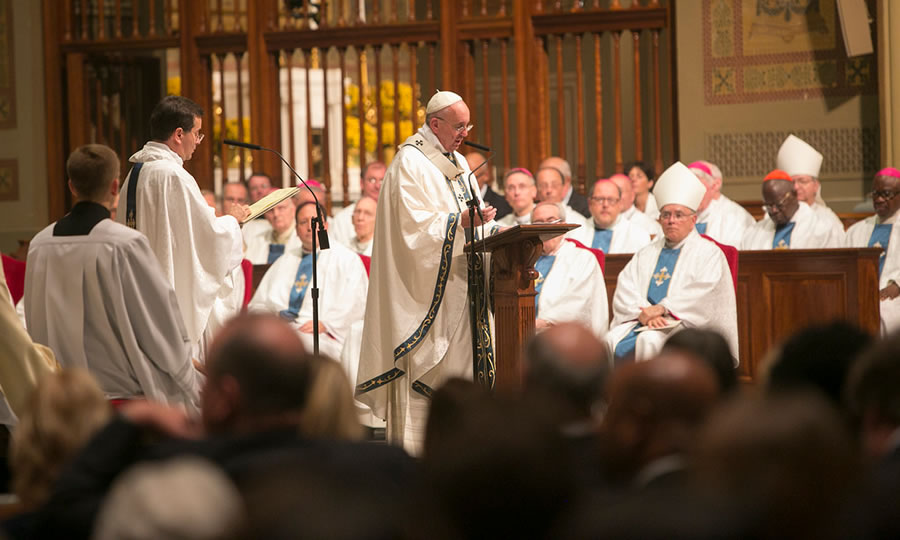Corpus Christi Blog

O, Come Let Us Adore Him (Part 1 of 4)
11-26-2020Weekly ReflectionJen Arnold, M.A. in Theology and CatecheticsO, come let us adore Him…
This Advent we will spend each Sunday reflecting a bit on what it means to adore Jesus in the flesh by exploring the Nativity through the eyes of four different groups of people who all came to adore Jesus at His birth.
The first two people to have the opportunity to adore the baby Jesus were His parents, Joseph and Mary. Imagine the quiet, still night on which He was born. Having travelled to Bethlehem for the census, the Holy Family was far away from their home and all the comforts within it. There were no comfortable rooms available for them in town and they were left to welcome their newborn baby in a stable amongst animals. The Savior of the world came into the world amidst the humblest of circumstances. What Joseph, Mary, and Jesus did have was each other, bound by an unmatched familial love for one another, which would transcend any and all circumstances, no matter how challenging they might seem. Although perhaps not the most comfortable arrangements, one thing the stable did offer them was the privacy to bask in that love together, alone as a family.
READ MORE
Christ the King
11-22-2020Weekly ReflectionJen Arnold, M.A. in Theology and CatecheticsThis Sunday we celebrate the Solemnity of Our Lord Jesus Christ, King of the Universe. This feast day was first established by Pope Pius XI in 1925 in response to the secularism he saw creeping into the world as more and more people began to reject having Jesus at the center of their lives. He stated that unless the Empire of the Lord was restored, there would be no peace and harmony between individuals or nations. In preparation for this week’s reflection, I read Pope Pius’ encyclical Quas Primas, in which he officially established the feast. As well as being a beautiful document, it also seems timelier today than ever before, which we will get into a little later. Before I dive into Pope Pius’ thoughts on the Kingship of Jesus, I will clear up a couple of historical details. In Quas Primas, Pope Pius proclaims the feast to take place on the last Sunday of October to precede All Saints Day. In 1969, Pope Paul VI moved the feast to the last Sunday in Ordinary Time, right before Advent, because he thought it more fitting to close out the year focusing on Christ’s dominion. Secondly, when Pope Pius originally established the feast, he called it the Feast of Christ the King. When Pope Paul changed the day of the celebration, he added “of the Universe” to emphasize the depth and breadth of the Kingdom of God. Both popes’ contributions to this feast have led to how we continue to celebrate this feast today.
READ MORE
Everything is Grace
11-15-2020Weekly ReflectionJen Arnold, M.A. in Theology and CatecheticsThere is a very simple, yet very profound and beautiful quote by St. Thérèse of Lisieux: “Everything is grace.” Everything is indeed grace and we will unpack what that means practically for us.
The Catechism of the Catholic Church defines grace like this: “Grace is favor, the free and undeserved help that God gives us to respond to his call to become children of God, adoptive sons, partakers of the divine nature and eternal life. Grace is a participation in the life of God.” (CCC #1996-1997, emphasis added.) The Catechism further differentiates between habitual grace and actual graces saying, “Habitual grace, the permanent disposition to live and act in keeping with God’s call, is distinguished from actual graces which refer to God’s interventions, whether at the beginning of conversion or in the course of the work of sanctification.” (CCC #2000, emphasis added.)
Starting at the beginning of this definition of grace, we see that the gift is free and undeserved. We currently live in a culture where people tell themselves they deserve to have anything they want, whenever they want, simply because they want it or think they have earned it in some way. So, to hear that God is giving us a free and undeserved gift might sound rather shocking to the modern ear. The truth is, that due to our sinful nature we don’t actually deserve this gift of grace that God freely offers us. The sins that we commit every single day are the same sins that nailed Jesus to His cross for our sake (another freely given and undeserved gift) which, by our human standards, is a pretty unforgivable thing to do. By offering us this undeserved gift of grace, God is demonstrating His unconditional love for us and His deep desire for us to return that love to Him.
The second part of the definition says that the gift of grace allows us to participate in the life of God, which is Trinitarian and thus includes the life of the Father, the Son, and the Holy Spirit. It means we can be yoked into the family of God and draw from that wellspring of familial love, affection, and assistance. It also means that every single human experience we could ever have can be yoked to every human experience Jesus ever had. Then, in each of these moments, we can tie in the third part of the definition; we can see how God intervenes for us and works with us and for us in everything we experience.
READ MORE
Papal Infallibility
11-08-2020Weekly ReflectionJen Arnold, M.A. in Theology and CatecheticsUnique to the Catholic Church is the role of the pope as head of the Church on earth. Thus, there are some common misunderstandings about his role and the Church’s teaching of papal infallibility. It is important to note that these misunderstandings have been around for a long time and are not just arising now. It is always worth refreshing our catechetical memories from time to time.
As we pronounce in the Creed, we say that our Church is apostolic, which means it is built on the “foundation of the Apostles,” since Christ chose them to be His first witnesses and teachers of the faith (CCC #857). The Church teaches that the twelve Apostles were the first bishops who went out and set up churches far and wide. We review the great commission:
And Jesus said to them, “All authority in heaven and on earth has been given to me. Go therefore and make disciples of all nations, baptizing them in the name of the Father and of the Son and of the Holy Spirit, teaching them to observe all that I have commanded you. And behold, I am with you always, to the end of the age.” (Matthew 28:18-20)
From Jesus’ words, we can extract certain things: 1) He is establishing them explicitly as teachers, 2) they have the power to do certain things per His authority, and 3) He will remain with the Church forever to help and guide her. We also know that later, on Pentecost, the Holy Spirit was sent as a guide and protector of the newly established Church and to empower the Apostles’ teaching office (Acts 2). Apostolic succession ensures that all bishops today can be traced back to the original Apostles.
READ MORE
Called to Holiness
11-01-2020Weekly ReflectionJen Arnold, M.A. in Theology and CatecheticsToday we celebrate the feast of All Saints and recognize and honor all the holy men and women who have come before us. Our Church gives us a gift in acknowledging the great saints who have left us their examples of how to be a follower of Jesus Christ with heroic virtue. We are not left on our own to navigate what it means to be a good disciple. Studying the saints can always inspire us to live out our Christian Faith in new ways.
As difficult as it may seem at times, we too are all called to be saints. We are all called to live a life of heroic virtue in imitation of Jesus. There is a wonderful document, called Lumen Gentium (Dogmatic Constitution of Christ), that came out of the Second Vatican Council. It outlines what the Church is and her role in the world. The chapter, “The Call to Holiness,” is dedicated to our role as laity since you and I are members of the Church. This is a universal call that applies to each one of us, regardless of our state in life. In other words, the call to holiness is not just for priests and religious, or other seemingly pious people, but to each and every one of us.
READ MORE